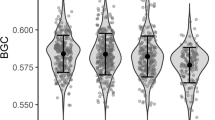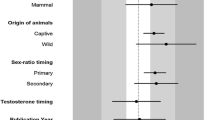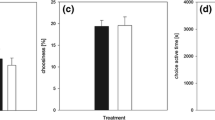Abstract
There is accumulating evidence that maternal hormones may play a role in offspring sex adjustment, but little is known about the costs of such hormone-mediated mechanisms. Recent studies have reported sex-specific effects of hormones on offspring viability. Specifically, we previously found that elevating the plasma androgen level in mothers results in a male-biased offspring primary sex ratio, but it affects the viability of sons negatively and daughters positively in zebra finches (Taeniopygia guttata; Rutkowska and Cichoń, Anim Behav, 71:1283–1288, 2006). In this study, we studied further fitness consequences of exposure to elevated yolk androgen levels in zebra finches. We measured growth rate and cellular immune response of nestlings that hatched from eggs laid by females injected with testosterone during egg laying and nestlings of unaffected control females. We found that sons of testosterone-treated females grew slower in comparison to sons of control females. The significant interaction between experimental group and offspring sex indicates that sons of testosterone-treated mothers suffered impaired immune responsiveness while daughters seemed to benefit from elevated androgen level in terms of enhanced immune responsiveness. We found no effects of androgens on offspring performance at adulthood—neither fecundity of females nor attractiveness of males was affected. We conclude that the benefits of biasing sex ratio towards males by increasing androgen level in the yolk may be limited due to negative effects on male offspring performance early in life.


Similar content being viewed by others
References
Andersson S, Uller T, Lohmus M, Sundstrom F (2004) Effects of egg yolk testosterone on growth and immunity in a precocial bird. J Evol Biol 17:501–505
Badyaev AV (2002) Growing apart: an ontogenic perspective on the evolution of sexual size dimorphism. Trends Ecol Evol 17:369–378
Badyaev AV, Schwabl H, Young RL, Duckworth RA, Navara KJ, Parlow AF (2005) Adaptive sex differences in growth of pre-ovulation oocytes in a passerine bird. Proc R Soc Lond B Biol Sci 272:2165–2172
Badyaev AV, Acevedo Seaman D, Navara KJ, Hill GE, Mendonca MT (2006) Evolution of sex-biased maternal effects in birds: III. Adjustment of ovulation order enables sex-specific allocation of hormones, carotenoids, and vitamins. J Evol Biol 19:1044–1057
Eising CM, Eikenaar C, Schwabl H, Groothuis TGG (2001) Maternal androgens in black-headed gull (Larus ridibundus) eggs: consequences for chick development. Proc R Soc Lond B Biol Sci 268:839–846
Eising CM, Müller W, Groothuis TGG (2006) Avian mothers create different phenotypes by hormone deposition in their eggs. Biol Lett 2:20–22
Folstad I, Karter AJ (1992) Parasites bright males and the immunocompetence handicap. Am Nat 139:603–622
Gil D, Graves J, Hazon N, Wells A (1999) Male attractiveness and differential testosterone investment in zebra finch eggs. Science 286:126–128
Gil D, Leboucher G, Lacroix A, Cue R, Kreutzer M (2004) Female canaries produce eggs with grater amounts of testosterone when exposed to preferred male song. Horm Behav 45:64–70
Groothuis TGG, Eising CM, Dijkstra C, Müller W (2005a) Balancing between costs and benefits of maternal hormone deposition in avian eggs. Biol Lett 1:78–81
Groothuis TGG, Müller W, von Engelhardt N, Carare C, Eising C (2005b) Maternal hormones as a tool to adjust offspring phenotype in avian species. Neurosci Biobehav Rev 29:329–352
Gwinner H , Schwabl H (2005) Evidence for sexy sons in European starlings (Sturnus vulgaris) Behav Ecol Sociobiol 58: 375–382
Hackl R, Bromundt V, Daisley J, Kotrschal K, Möstl E (2003) Distribution and origin of steroid hormones in the yolk of Japanese quail eggs (Coturnix coturnix japonica). J Comp Physiol B Biochem Syst Environ Physiol 173:327–331
Johnson AL (2000) Reproduction in the female. In: Whittow GC (ed) Sturkie’s avian physiology. Academic Press, pp 569–596
Ketterson ED, Nolan V (1999) Adaptation exaptation and constraint: a hormonal perspective. Am Nat 154:273–284
Lipar JL, Ketterson ED (2000) Maternally derived yolk testosterone enhances the development of the hatching muscle in the red-winged blackbird Agelaius phoeniceus. Proc R Soc Lond B Biol Sci 267:2005–2010
Mousseau TA, Fox CW (1998) Maternal Effects as Adaptations. Oxford University Press, New York
Müller W, Eising CM, Dijkstra C, Groothuis TGG (2002) Sex differences in yolk hormones depend on maternal social status in Leghorn chickens (Gallus gallus domesticus). Proc R Soc Lond B Biol Sci 269:2249–2255
Müller W, Groothuis TGG, Eising CM, Dijkstra C (2005) An experimental study on the causes of sex-biased mortality in the black-headed gull—the possible role of testosterone. J Anim Ecol 74:735–741
Navara KJ, Hill GE, Mendonça MT (2005) Variable effects of yolk androgens on growth, survival, and immunity in eastern bluebird nestlings. Physiol Biochem Zool 78:570–578
Navara KJ, Hill GE, Mendonça MT (2006) Yolk androgen deposition as a compensatory strategy. Behav Ecol Sociobiol 60:392–398
Petrie M, Schwabl H, Brande-Lavridsen N, Burke T (2001) Sex differences in avian yolk hormone levels. Nature 412:498
Pike TW, Petrie M (2005) Maternal body condition and plasma hormones affect offspring sex ratios in peafowl. Anim Behav 70:745–751
Pilz KM, Adkins-Regan E, Schwabl H (2005) No sex difference in yolk steroid concentrations of avian eggs at laying. Biol Lett 1:318–321
Royle NJ, Surai PF, Hartley IR (2001) Maternally delivered androgens and antioxidants in bird eggs: complementary but opposing effects? Behav Ecol 4:381–385
Rubolini D, Romano M, Martinelli R, Saino N (2006a) Effects of elevated yolk testosterone levels on survival, growth and immunity of male and female yellow-legged gull chicks. Behav Ecol Sociobiol 59:344–352
Rubolini D, Romano M, Martinelli R, Leoni B, Saino N (2006b) Effects of prenatal yolk androgens on armaments and ornaments of the ring-necked pheasant. Behav Ecol Sociobiol 59:549–560
Rutkowska J, Cichoń M (2006) Maternal testosterone affects primary sex ratio and offspring survival in zebra finches. Anim Behav 71:1283–1288
Rutkowska J, Cichoń M, Puerta M, Gil D (2005) Negative effects of elevated testosterone on female fecundity in zebra finches. Horm Behav 47:585–591
Rutstein AN, Gilbert L, Slater PJB, Graves JA (2005) Sex-specific patterns of yolk androgen allocation depend on maternal diet in the zebra finch. Behav Ecol 16:62–69
Saino N, Incagli M, Martinelli R, Ambrosini R, Møller AP (2001) Immunity growth and begging behaviour of nestling barn swallows Hirundo rustica in relation to hatching order. J Avian Biol 32:263–270
Saino N, Ferrari RP, Romano M, Martinelli R, Lacroix A, Gil D, Møller AP (2006) Maternal allocation of androgens and antagonistic effects of yolk androgens on sons and daughters. Behav Ecol 17:172–181
Schwabl H (1996) Maternal testosterone in the avian egg enhances postnatal growth. Comp Biochem Physiol 114A:271–276
Searcy WA (1988) Do female red-winged blackbirds limit their own breeding densities? Ecology 69:85–95
Sockman KW, Schwabl H (2000) Yolk androgens reduce offspring survival. Proc R Soc Lond B Biol Sci 267:1451–1456
Staub NL, De Beer M (1997) The role of androgens in female vertebrates. Gen Comp Endocrinol 108:1–24
Strasser R, Schwabl H (2004) Yolk testosterone organizes behavior and male plumage coloration in house sparrows (Passer domesticus). Behav Ecol Sociobiol 56:491–497
Uller T, Eklöf J, Andersson S (2005) Female egg investment in relation to male sexual traits and the potential for transgenerational effects in sexual selection. Behav Ecol Sociobiol 57:584–590
Veiga JP, Viñuela J, Cordero PJ, Aparicio JM, Polo V (2004) Experimentally increased testosterone affects social rank and primary sex ratio in the spotless starling. Horm Behav 46:47–53
von Engelhardt N (2004) Proximate control of avian sex allocation. A study on zebra finches. Ph.D. thesis, University of Groningen, The Netherlands
von Engelhardt N, Carere C, Dijkstra C, Groothuis TG (2006) Sex-specific effects of yolk testosterone on survival, begging and growth of zebra finches. Proc R Soc Lond B Biol Sci 273:65–70
Acknowledgments
We thank L. Czajkowska for help with the behavioral trials and D. Acevedo Seaman, J. Graves, and two anonymous referees for comments. J. Rutkowska was supported by the grant from Polish Ministry of Science and Higher Education in years 2004–2006 and by the Foundation for Polish Science. The study was partly founded by DS/WBiNoZ/INoŚ/757/06. Experiments were carried out under license from the Local Ethical Committee at the Jagiellonian University and they comply with the current laws of Poland.
Author information
Authors and Affiliations
Corresponding author
Additional information
Communicated by J. Graves
Rights and permissions
About this article
Cite this article
Rutkowska, J., Wilk, T. & Cichoń, M. Androgen-dependent maternal effects on offspring fitness in zebra finches. Behav Ecol Sociobiol 61, 1211–1217 (2007). https://doi.org/10.1007/s00265-007-0351-0
Received:
Revised:
Accepted:
Published:
Issue Date:
DOI: https://doi.org/10.1007/s00265-007-0351-0




